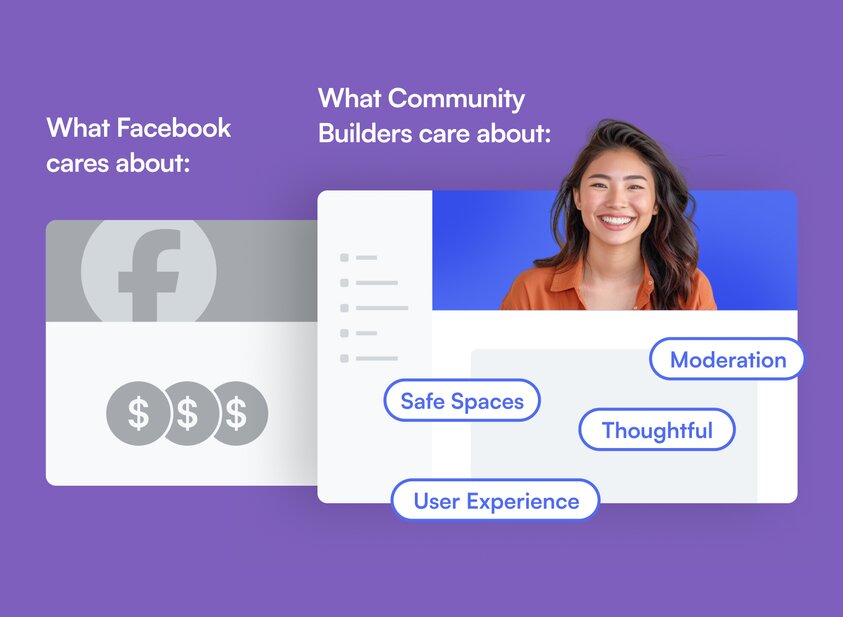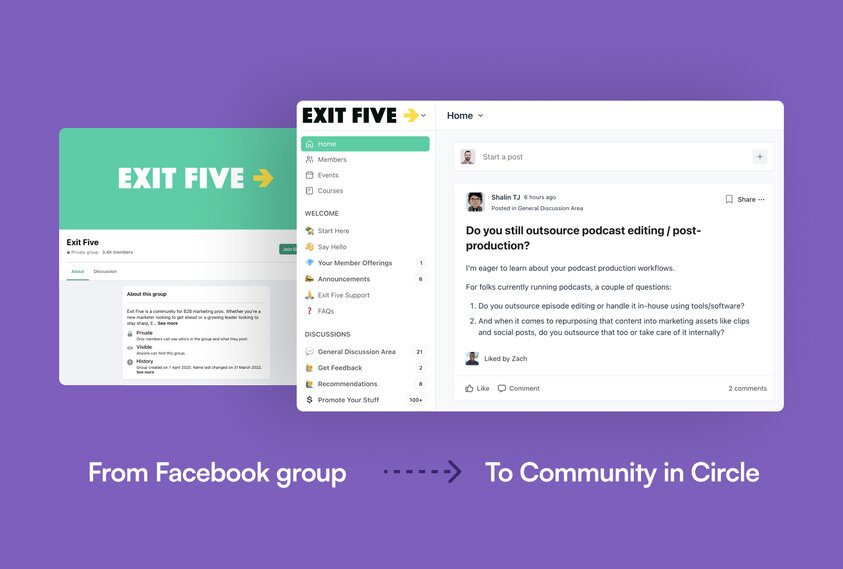Why it's time to take your community off Facebook Groups
Picture this: you’ve spent blood, sweat, and years painstakingly building a +20,000 strong Facebook Group. Not only do you run challenges, trainings, and actively find new clients through these groups—they’re a key strategy in how you build your business and pay your bills.
And then, one day, your account is hacked, then banned, and finally: deleted.
“De-platformed,” they call it.
That’s exactly what happened with Karin Carr, a realtor in Savannah, Georgia—and why she’s now such a champion of building a “platform-proof business”.
Karin is not alone in experiencing this massive wake-up call:
“If your entire business runs off a platform that you do not control, that is very dangerous. Stop and think: if you lost your whole community, what would happen to your business?”
But even apart from the fear of being de-platformed, there are a million and one other reasons to take control of one of your most precious resources—and move it off Facebook, as soon as humanly possible.
In order to help protect your community and business, in this article we’ll cover:
- 10 reasons moving off Facebook is better for your business
- Crucial tips for migrating your community
Let’s get started.
10 reasons to move your community off Facebook
1. To improve your user experience
Let’s be honest—when it comes to Facebook’s goals as a business, they’re not too concerned about what community builders care about. They exist to make money.

Just because you decided (intentionally, or accidentally) to build a community on Facebook, doesn’t mean that Facebook is building their experiences for you. They’re building features to turn a profit. Full stop.
This means that if they need to drop crucial community resources or features, like shutting down Pages, minimizing Group activity, or deprioritizing certain community posts, that’s what they’ll do. Because your business’s content and brand values aren’t their priority.
⏩ TLDR: If you want your members to have a great experience, you need to find a platform that cares as much about that journey as you.
2. To escape the algorithm
We love a good algorithm as much as the next company, but Facebook has your community’s success in a vice grip—and it’s not letting go anytime soon.
Facebook decides if your content is worthy or not, how often and widely to share it, and if it needs more of your money to boost it for higher visibility or engagement. That doesn’t sound like an even exchange to us.
The community you’ve built is incredibly valuable, and you should be able to decide how, when, and if to market within it—not the algorithm.
3. To focus on meaningful conversations
To better understand why Facebook isn’t built for communities, all you have to do is consider how it makes money: using the psychology of interruption (ads) and addiction to endless scrolling, clicking, liking, forever and ever.
Now, compare that with what makes good communities great: focused, meaningful interactions between members.
This means that Facebook is organically against rich, valuable engagement—by design.
It also means that certain features that help creators organize content and conversations, like spaces or category-specific subgroups, simply don’t exist on Facebook.
4. To monetize your community
Let’s talk about the elephant in the room: money.
We’ve all seen “exclusive” Facebook Groups advertised as a benefit to a membership or course. But if you’ve tried it before, you’d see…
- How complicated it is sync payment issues, refunds, or cancellations with group member status
- How non-intuitive your checkout process can be (and how it can deter people from purchasing)
- How time-consuming it can be for your team to set up cross-sells or up-sells
The lack of integration between Facebook Groups and financial tools is a massive downside for those who value efficiency, user experience, and scalability. It makes monetizing your community much harder than it has to be.
5. To re-engage your members
There’s no human behavior more predictable than disliking change.
So when you’re considering trying to migrate a mass amount of people, fear can really kick in:
- “What if people don’t follow me? What if they’re too used to going to Facebook?”
- “What happens if I can’t make the same money?”
- “What if the experience ruins the expectation people have of my brand?”
And the truth is, there will be people who don’t follow you if you change something they’ve grown used to.
But moving platforms acts as a hygiene-check for your list: it’s just good business sense. Were you really profiting from those folks who checked in once every few months, and adding nothing to the space?
Dave Gerhardt, who runs one of the biggest online communities for B2B marketing professionals, Exit Five, recently moved his community off Facebook.
While initially some members complained, others specifically mentioned they hadn’t joined when he had the community aspect hosted on Facebook—whether because they didn’t have an account, didn’t want to be linked to their personal accounts (vs. business ones like LinkedIn), or because they didn’t want to “deal with Facebook”.
Since the switch, members are saying his community is “10 times more valuable.”
6. To own your membership data
What finally pushed Dave to give Facebook the boot was this:
“One of the challenges of being on Facebook is, I have [these] members, but I don’t have their contact information. It’s not easy to market to them.”
As a marketing professional, he couldn’t easily market to his community without hacking his way through various systems.
Why? Because there’s
⛔No way to export engagement, contact, or preference data from users in groups
⛔No way to sync posting or engagement history with other marketing tools
⛔No way to flag members across platforms for moderation
Nothing is ever all in one place.
When you don’t have control of your user’s data, you can’t run efficient marketing campaigns—nor promise privacy in the way you would on a private community platform.
7. To automate membership management
Facebook Groups weren’t created to be integrated with other community, financial, or customer management tools.
Instead of smooth user and manager experiences for
- Adding new members and removing churned ones
- Limiting and blocking folks
- Setting up trials and discounts
- Allowing access to your suite of products
You end up creating confusion for your users, endless unanswered support tickets, and constant headaches for you and your team.
Plus, have you ever tried to contact Facebook support to get an issue resolved?
Point made. (Just kidding—kind of.)
Managing memberships is already an admin-heavy task on a day-to-day basis. Facebook makes it an absolute time-sucking nightmare.
8. To provide valuable, organized content
Individual user experiences like the ones on Facebook—where everyone’s feed shows something different—may be great for a social media platform, but it’s not great for smaller, focused communities.
In Groups, it’s impossible to organize uploaded content like videos, files, etc, in a way that makes sense for both you and your members.
When people have a hard time finding something, it creates a point of friction in their experience. And instead of looking for it, they tend to leave instead.

9. To control moderation and rule-making
Karin’s story at the beginning is not the first, and definitely not the only one of folks getting blocked on Facebook out of the blue.
There are lots of communities out there that discuss political or sensitive topics (and lots where there’s nothing inflammatory) where members get auto-blocked on a regular basis despite working hard to provide proactive rule-setting and supportive moderation.
And since Facebook support is so difficult to reach and so inflexible about their process, it becomes impossible to contest and get reinstated—even if it was a random troll with an agenda that caused mayhem.
10. To reduce distractions
The final reason to move your community off Facebook for good is the relentless spammers, fake accounts, and self-promoters that are impossible to escape there.
Despite having folks agree to rules prior to joining, the task of identifying spammers still lands squarely on your shoulders. And what a task it can be.
Instead of worrying about the quality of conversations, and the promotions and offers you want to put in front of your members, you end up worrying about the latest inflammatory, useless, and self-promoting trolls that infiltrate your group.
And as a creator—your time is already stretched thin. The more time you spend fighting spam, the less time you have to proactively build what you’re dreaming of, and the less value your members get.
Tips for migrating your community off of Facebook
Back when Noelle Flowers ran the community for Teachable members, she successfully moved a group of 40,000 people off Facebook onto Circle. Here are her tips:
- Engage key members early: Involve active members in planning your new community by discussing their concerns, previewing the features, and asking for feedback to make sure they’re bought in.
- Use your “support squad”: While you may be worried about the move, involving members who are excited about the change to positively influence others (and alleviate concerns) can help you build momentum.
- Highlight the upgrade: This one is a bit of a no-brainer, but make sure to emphasize the features and benefits of the new community early and often. Focus your language on new, exclusive elements like Q&As, live events, and other high-profile features that make the new community shinier than the old.
- Accept mixed reactions: You’ll never please 100% of the people 100% of the time. Some will be frustrated, others will be thrilled. Remember that you’re moving for a lot of good reasons, and trust that the right members will adapt.
If you’re more of a video person, here’s a great resource by the Smart Passive Income Team [8 min]:
The benefits of having more control of your community platform
The unfortunate truth is this: The more you depend on your community, the more you risk losing if Facebook decides to randomly shut down your group (or block your members, throttle your reach, etc.)
Being on Facebook is like renting an apartment: you’re always at the behest of someone who could change their mind. Maybe the rent will go up, or the landlord refuses to fix the leaky radiator, or a group of raccoons moves in next door who party all night.
But when you take control and get your own home, it’s freeing. You control the experience, the vibe of the space, and who gets to come in. You can make it a smart home or an 18th century revival, you can leave piles of books everywhere or organize a library. You can set rules and regulations for how people behave when they’re there, because it’s your space.
And nobody will shut it down without your say-so.
Meanwhile folks on Facebook will have to delay launches, pause campaigns, and pivot as Facebook continues to hold their fate in its hands, like the outage that happened on March 5, 2024 (and many other days).
That’s why we created Circle. It’s an online community platform that brings together your members, discussions, events, courses, and content—all in one place, under your own brand. Plus, you get access to our customer community full of handy resources and over 8,500 community builders on the same journey as you.